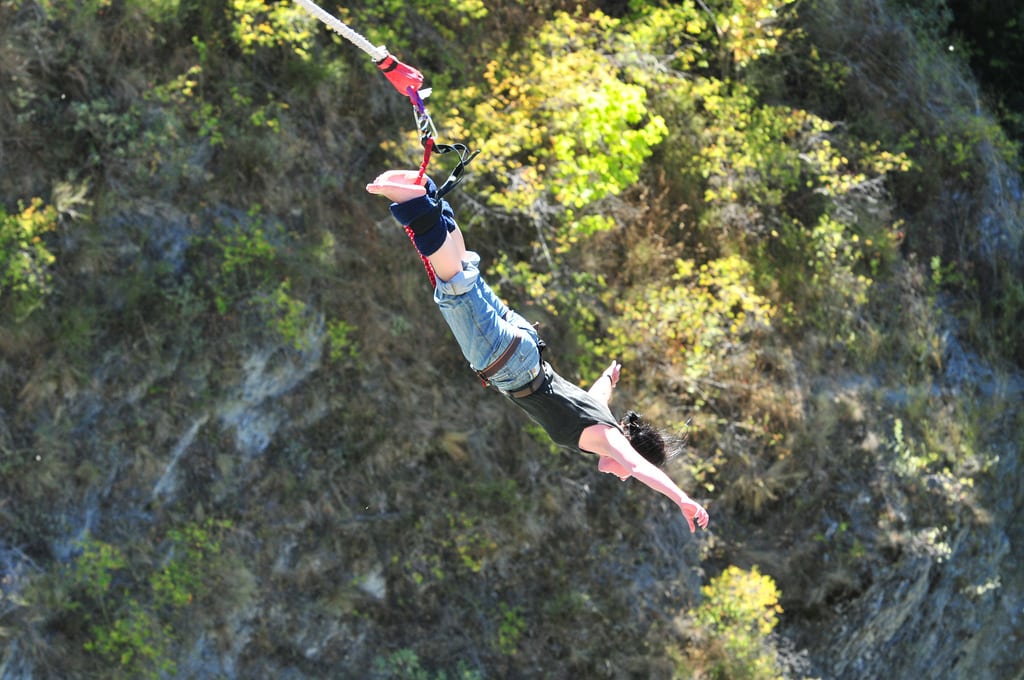Skift Take
Young Chinese travelers increasingly want to connect with their adventurous sides as that market matures, but they're also bungee jumping, luging, and skiing to show-off cool photos on their social media profiles to prove they deserve attention and respect.
Snapping photos of Times Square and the Eiffel Tower provide instant gratification for many travelers eager to share selfies with friends on social media, but a growing faction of Chinese tourists also seek adventure experiences such as bungee-jumping from steep river gorges and hiking through glacial terrain.
Last year Chinese travelers made up two-thirds of Queenstown, New Zealand’s leading skydive operator’s business and hot air ballooning ranks first as the adventure activity the Chinese say they’re most interested in pursuing during a trip to the destination.
Chinese travelers visiting New Zealand independently increased 60% year-over-year in 2014 and independent visitors often have more confidence and flexibility to do what they want than tour group participants have, said Christine Adair, a spokesperson for Tourism New Zealand.
These adventure travelers don’t fit the typical profile of selfie stick-carrying Chinese tourists getting bussed around from tour stop to tour stop without taking a deeper dive into a place. But some researchers and destinations like New Zealand say they’ve found Chinese tourists want to connect with destinations in unique and exciting ways.
New Zealand is the top destination for Chinese adventure travelers who can’t find many extreme sports or activities in their homeland. The country is known for outdoor activities transcending the intense sensuality of those in many other regions, albeit, Tourism New Zealand says adventure activities aren’t the most important factor for Chinese tourists making the relatively short hop to the destination. Between 14 and 19% of Chinese who plan to travel to the island nation rank adventure activities and adrenaline rushes as their top motivators.
“Generally when we ask future potential Chinese visitors why they think they would like to come to New Zealand on holiday they tell us their top reasons for visiting are to ‘get in touch with nature’ and ‘to broaden my mind,'” said Adair. “Still, I would say Chinese visitors are becoming more adventurous because more independent Chinese travelers are coming and adventure is relative, compared to German backpackers the Chinese are nowhere near as adventurous but we do know that there are increased number of Chinese people doing skydiving, for example.”
Auckland and Queenstown-based AJ Hackett Bungy, a bungee-jumping attraction, said Chinese visitors are now a major growth segment for their experiences and a glacier boat tour company on the country’s South Island said the Chinese are now 60% of its total market, up significantly from two years ago.
| Adventure Activity | % of Chinese Tourists Saying They Want to do this in New Zealand |
|---|---|
| Abseiling or caving | 54% |
| Bungy jumping | 46% |
| Hot air ballooning | 71% |
| Jet boating | 52% |
| Luge | 43% |
| Paragliding | 57% |
| Skydiving | 47% |
| Tubing, water sledging or river surfing | 63% |
| White water rafting | 58% |
| Ziplining | 50% |
| Zorbing | 39% |
Source: Tourism New Zealand
What’s Behind the Adventure Craze?
More than half of Chinese outbound tourists who visit Australia, the U.S., France and Germany are relatively young (between 30 and 49 years old) and take advantage of visa waivers, more affordable flight connections and the opportunity to do something they probably didn’t indulge during childhood.
“As the [Chinese market] has become more mature and blending itself with the more common practice of the free independent traveler they are certainly adapting quickly to the more adventurous products here in New Zealand,” said Zane Smith, a researcher at New Zealand’s Tai Poutini Polytechnic who works closely with adventure tourism partners and attractions.
“In the past when most of the Chinese were aboard tour buses it certainly was a barrier to them ‘finding their way’ to the range of experiences New Zealand has to offer.”
Safety is also a top concern as Chinese are often more trusting of foreign adventure attractions following stringent guidelines than those closer to home, said Wolfgang Arlt, a researcher at the Chinese Outbound Tourism Research Institute.
“Adventure tourism activities really don’t exist in China like they do elsewhere and we think of these outbound Chinese adventure travelers as part of the second wave of Chinese outbound travel,” said Arlt. “We know that these young Chinese travelers interested in adventure activities also have plenty of money to spend.”
The lights and sights of Las Vegas also draw many Chinese visitors looking for thrills but on a different echelon than a destination like New Zealand.
“A lot more Chinese travelers are now repeat travelers and they’re looking for something more novel,” said Brian Buchwald, CEO of Bomoda, a consumer intelligence company that tracks outbound consumers including Chinese travelers. “Travelers are drawn to the idea of ‘a city that never sleeps’ and they believe they can get that unique and crazy experience in a place like Las Vegas. They enjoy the themes like Paris and New York being concentrated in one place that makes them feel like they’re getting a little of everything.”
The Daily Newsletter
Our daily coverage of the global travel industry. Written by editors and analysts from across Skift’s brands.
Have a confidential tip for Skift? Get in touch
Tags: adventure travel, china outbound
Photo credit: A Chinese traveler bungee jumping off a bridge over the Kawarau River in New Zealand. Helena Jinx / Flickr
